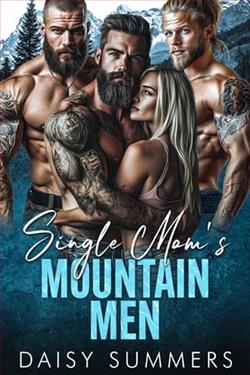Page 26 of Scarlet Thorns
Inside, candles flicker against burgundy walls, casting dancing shadows that make the room feel alive. The velvet chair where I confessed my deepest fears sits exactly where I left it, patient and waiting. Everything is the same. Perfect. Untouched by the diagnosis that’s rewritten my entire future.
I sink into the chair and let the mask settle over my features, transforming me into someone else. Someone whose body isn’t a battleground. Someone who doesn’t carry the weight of chronic illness like a stone in her chest.
The tears start without permission.
They’re different from the ugly sobs in the parking lot earlier. These are quiet, exhausted, mourning tears for the woman I was this morning— naive enough to believe pain always had solutions, that bodies were trustworthy, that wanting children was enough to ensure you could have them.
Endometriosis.
I press my palms against my eyes, trying to stop the flow, but grief has its own rhythm. So I let it come. Let it wash through me until my chest feels hollow and my breathing steadies into something resembling composure.
He probably won’t come tonight.
Why would he?
Lightning doesn’t strike twice, and whatever magic existed between us was probably a one-time thing. A beautiful anomaly that I’ve built into something bigger than it was because I’m desperate for connection.
But God, I hope he does. I need to remember what it feels like to be heard, desired instead of diagnosed. To be seen as a woman instead of a patient. To exist in a space where my worth isn’t measured by my reproductive capacity.
The soft click of the adjoining bathroom door makes my pulse spike.
Running water. The rush of a shower, steam seeping under the doorframe. He’s here. Actually here. My skin prickles with awareness, every nerve ending suddenly alive and focused on the sounds filtering through the wall.
What if it’s someone else this time?
I smooth my robe with hands that won’t stop shaking, trying to look composed instead of devastated. Trying to be the mysterious woman from last week instead of the broken girl who cried in a doctor’s office this afternoon.
The water stops.
Silence stretches, taut and electric.
When the door opens, my breath catches so sharply it hurts.
It’s him.
He stands in the doorway, towel riding low on narrow hips, water still beading on bronze skin. The candlelight plays across muscles that speak of discipline and violence, illuminating tattoos that tell stories I’ll never know. His dark hair is slicked back, revealing the sharp angles of his face behind the leather mask.
He’s magnificent. Dangerous. Everything my rational mind should avoid and everything my body craves with frightening intensity.
He settles into the chair across from me without a word, studying my face with the same penetrating focus as before. Like he can see through the lace to the woman underneath. Like he knows exactly what kind of day I’ve had.
“I was hoping you’d be here,” I whisper, the words tumbling out before I can stop them. “Last time was… nice.”
The understatement hangs between us like a confession. Nice doesn’t begin to cover what happened in this room— the way he listened without judgment, the electric connection that made me feel alive for the first time in months.
“Speak to me,” he says simply.
Where do I even begin? How do I explain that everything I thought I knew about my body, my future, my worth as a woman has been stripped away in a single doctor’s appointment?
“I got some medical news today,” I start, then stop, overwhelmed by the magnitude of what that simple statement contains.
His expression doesn’t change, but something shifts in his posture. Complete focus. Like my words matter more than anything else in the world.
“The pains… I have endometriosis.” The word feels foreign, clinical and cold. “It’s a chronic condition that… that means my body is basically attacking itself. The pain I’ve been dealing with, the irregular cycles, the way intimacy became impossible— it all makes sense now.”
I pause, waiting for him to offer platitudes or solutions or any of the things people say when they don’t know how to fix something. But he just watches, patient and present, giving me space to fall apart.
“The worst part isn’t the pain,” I continue, my voice breaking. “It’s what it means for my future. Having children might be difficult. Maybe impossible. And I’ve wanted to be a mother since I was little, you know? I used to line up my dolls and pretend they were my babies, plan their names and their nurseries and their whole lives.”















